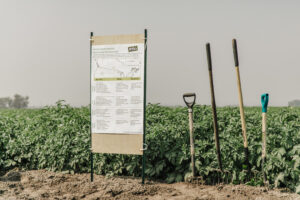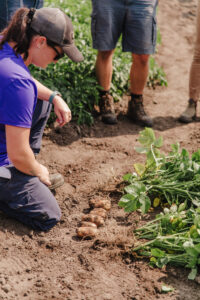Potato Varieties: A Vision for 2030
(Sponsored) When it comes to potato varieties, the widely shared goal for 2030 is to replace most of the standard varieties that have been grown for many years to adopt new varieties that will drastically reduce nitrogen inputs, and improve water use, efficiency, and yield.
Seed Pipeline
To achieve this goal, McCain Foods is committed to developing a robust seed pipeline for new potato varieties that will help growers meet sustainability goals while maintaining high yields and quality. “You must look 5 years out when planning a seed pipeline,” says Nicole Nichol, Director Agriculture Seed and Variety. “Seed multiplication of potatoes takes a very long time compared to other crops.” To address this, McCain brought on a seed team that includes a seed agronomist and two seed representatives working with seed growers to contract volume. The seed team aims to provide guidance and financial backing to growers, their aim is to de-risk and diversify across North America – expanding westward to be closer to the consumer.
Innovation Hubs
 McCain Foods conducts variety trials across North America to evaluate traits like disease resistance, nitrogen use efficiency, yield, and quality. High potential varieties are advanced to pre-commercial trials on farm fields. The current pre-commercial trial at the Idaho Innovation Hub is testing varieties selected for their potential to thrive in sustainable farming systems.
McCain Foods conducts variety trials across North America to evaluate traits like disease resistance, nitrogen use efficiency, yield, and quality. High potential varieties are advanced to pre-commercial trials on farm fields. The current pre-commercial trial at the Idaho Innovation Hub is testing varieties selected for their potential to thrive in sustainable farming systems.
Nichol points out, “A healthy new variety pipeline will provide flexibility for our end customers and help ensure supply reliability. By working with customers and seed growers, I believe we can gain approval for new variety options across North America by 2030.” Two top varieties highlighted in Idaho were King Russet for long-term storage and Caribou Russet for its early maturity, resistance to nematodes, and moderate resistance to verticillium. Caribou reduces the need for fumigation and improves EIQ score, which is aligned with McCain’s Regenerative Agriculture Framework. Burbank is not a control at the Hub since Caribou Russet offers better yields and with 20% less nitrogen than Burbank to achieve same yield and quality. “By running these pre-commercial trials within the Innovation Hub, we are readying for the future where we will have to get more with less: gain more yield, keep consistent great quality, and navigate climate challenge,” says Nichol.
These varieties could help growers reduce inputs like nitrogen fertilizer while maintaining productivity. Other varieties in development offer traits like resistance to diseases such as verticillium that may allow for reduced fumigation needs. By providing a portfolio of climate-resilient varieties, McCain aims to help growers meet sustainability targets while ensuring supply reliability for customers.
Partners
 Growers who visited the Innovation Hubs are enthusiastic about these top two options – several of them have both of these varieties in their field already and they are keen to get more. McCain is also encouraging conversations with researchers examining diseases. Most of all, the company is looking to continue sharing learnings and insights with customers. “The bottom line is supply assurance,” says Nichol. “There is a need for climate resilient varieties to continue to deliver the volume and quality that customers expect and we believe we have those varieties: they have plasticity, heat stress tolerance and more. There is no one variety that will solve all the North America challenges. Similar to a financial portfolio, we need to diversify the risks with multiple varieties.” Customers are increasingly engaged in conversations around varieties and the importance of flexibility to assure supply for the long term.
Growers who visited the Innovation Hubs are enthusiastic about these top two options – several of them have both of these varieties in their field already and they are keen to get more. McCain is also encouraging conversations with researchers examining diseases. Most of all, the company is looking to continue sharing learnings and insights with customers. “The bottom line is supply assurance,” says Nichol. “There is a need for climate resilient varieties to continue to deliver the volume and quality that customers expect and we believe we have those varieties: they have plasticity, heat stress tolerance and more. There is no one variety that will solve all the North America challenges. Similar to a financial portfolio, we need to diversify the risks with multiple varieties.” Customers are increasingly engaged in conversations around varieties and the importance of flexibility to assure supply for the long term.
Ambitions for 2030
McCain is working to increase seed availability for promising new varieties by coordinating with seed growers. With continued variety development, McCain’s goal is to have largely replaced standard varieties by 2030 while gaining full customer approval for new options. This will drastically reduce nitrogen inputs, reduce EIQ scores, and move growers along the Regenerative Framework to achieve the commitment of 100% regen acres by 2030. “Seed and varieties will help McCain and growers deliver on sustainability commitments and continue striving into the future,” says Nichols.
If growers have questions about varieties in their regions or if they want to grow a new potato variety, McCain encourages them to connect with a local McCain representative who will facilitate a conversation.
To learn more about McCain, visit www.mccain.com/sustainability/smart-sustainable-farming.
© 2023 McCain







